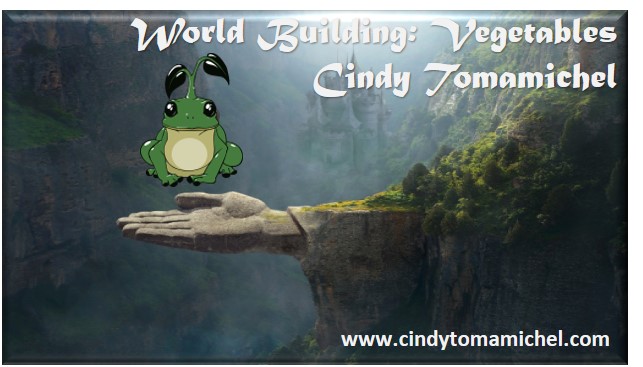“Eat food, not too much, mostly plants.” The advice from Michael Pollan, author of ‘The Omnivores Dilemma’ would sound strange to many people not in an affluent first world country. Most people in history and in many places today don’t have a choice, with meat being a much smaller part of their diet. This dichotomy then affects fiction, particularly if you wish to write something a little more diverse than contemporary billionaire romances.

Vegetables have formed a major and reliable part of the human diet forever. The human digestive track and dental pattern has evolved to cope with both meat and a great deal of plant food. Gathering is the major source of food from day to day, rather than hunting for most areas of Earth. But in gathering plants, we changed them forever.
Vegetables can change with cultivation fairly quickly, given their shorter growing cycle. Gregor Mendel with his experiments on peas was able to map a gene sequence after a number of years. The urge to produce a palatable cabbage must have been more urgent than pea flowers. In Roman times, cabbages were quite small, lettuce bitter, and things like brussels sprouts and broccoli were new or non existent. Orange carrots are also quite recent (around 1500’s), having been purple and white in the past.
Gathering seed crops can also alter a plant. Corn, for instance, while eaten as a vegetable is a grain. The original corn ancestor dropped seed readily, which was useful for the plant, but not so much if you were collecting it. Over time, gathering the seed heads that stayed on the cob altered the appearance of corn significantly, which in turn helped more people flourish with greater food availability. Corn now relies on people for its germination and growth.
Historically, people also ate a wider variety of greens. In the Earth Children series, Auel mentions gathering the first of the Spring greens to remedy scurvy after a long winter. Many plants considered weeds today are nutritious – chickweed and dandelions for instance. Or they may fall out of use or fashion – sugar beets and mangelwurzels. So a fantasy or historical fiction writer could make use of these plants to add some interesting details. Culpeper is a good reference for this, as are groups that forage wild food, and heritage seed companies.
Growing vegetables may also change with circumstances. The original gatherers might have scattered seeds or planted in the hopes of a seasonal harvest when next they passed. The development of agriculture is said to be the basis of civilisation, providing the food needed for a dense population. But that brings its own problems. The Irish potato blight – a rust that destroyed potatoes then led to mass starvations and migration. Today we face the same problems with growing monocrops of genetically identical plants. Insects, rusts and blights are combatted with chemicals that poison the environment. What major changes would come out of this?
And so we get back to permaculture – growing plants in harmony and recycling. While not a large scale method, organic farming is at odds with genetically resistant crops which can produce the food amounts needed. But for a family or town after the apocalypse, permaculture might be the answer. ‘The Lucky Prepper’ by Emma Zeth is a book that uses this idea.
But what about the future? Hydroponics units in starships? Pollination and pest control by importing predator species? Alien plant species that can adapt to human food needs? Genetic engineering?
Our digestion, evolved through hundreds of thousands of years will still need vegetables, now and into the future. What form they take or have been will be quite different to what is in your shopping trolley today.
Enjoy this blog? Have a think about signing up via my website or catch them as they fly around the ether on twitter or facebook. They will stay where they are pinned on pinterest.
For those that have not read Druid’s Portal yet, here is a link to the first chapter of DruidsPortal and to the second in the series Druid’s Portal: The Second Journey, and you can read a preview here.
Scifi more your thing? Try my short stories in the anthologies Quantum Soul and Tales from Alternate Earths 2. Or what about horror? Try Haunted, a free new horror anthology.
Are you an author? My book “The Organized Author” is out now. Grab a copy here.
Doing NaNo this year or know someone that is? Grab a copy of my free guide “NaNoWriMo Ready.”
If you are keen to chat with other scifi peeps, then check out the Knights of the Scifi Roundtable facebook group and subscribe to their newsletter https://mailchi.mp/29fb30bca8e4/update-subscription
Short stories and poetry? Try the Rhetoric Askew anthologies: Mixed genre, Adventure or Romance . Or my own collection Tales of Imagination.
Tired from all that thinking? Try a 5 Minute Vacation! 5 Minute Vacation Now available on Story Origin as a free review copy: https://tinyurl.com/5MVReviewAnd my own author newsletter, for book news, odd facts, recipes and random freebies. Sign up here. Every subscription gets a free copy of my short stories ‘New Beginnings’ two tales of later in life romance.

